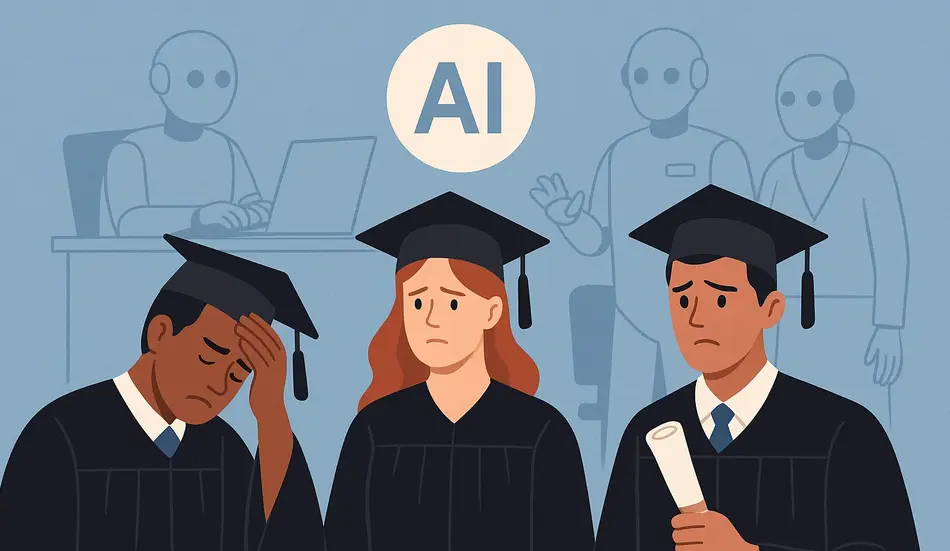The unemployment rate for new college graduates has recently surged to unprecedented levels, with some economists warning that businesses are now systematically replacing entry-level positions with artificial intelligence. This alarming trend represents a fundamental shift in the job market that could reshape career paths for millions of young professionals entering the workforce.
The Shocking Reality: College Grads Face Higher Unemployment Than National Average
For the first time in history, the unemployment rate among recent college graduates has exceeded the national unemployment rate, ballooning to 6.6% over the past 12 months. This statistic defies conventional wisdom, as those with higher educational attainment typically enjoy better employment prospects than those with less education.
Michael Maluso’s Story: A Mechanical Engineering Graduate’s Struggle
Take 22-year-old Michael Maluso, who recently earned his degree in mechanical engineering from the University of Connecticut. Despite applying for nearly 200 positions in his field, he’s back managing his hometown pool this summer. “I was told by a lot of people that I was going to get a job right out of college,” he says, “and then all of a sudden there’s no jobs.”
This experience is becoming increasingly common across all industries, particularly in technology and engineering sectors where AI implementation is most advanced.
Why AI is Targeting Entry-Level Positions
The Perfect Storm: Automation Meets Economic Pressure
Companies are eliminating formative entry-level jobs and handing this work over to artificial intelligence systems. Tech companies are leading this transformation, but the trend is spreading rapidly across all sectors. According to Oxford Economics’ Matthew Martin, “This goes against what you would expect. Those with higher educational attainment usually have better employment prospects than those with less educational attainment.”
AI’s Impact on Repetitive Tasks
Nariman Farvardan, president of Stevens Institute of Technology, explains that AI is permeating every aspect of our lives. His school has been preparing for the AI revolution for the last decade, and he expects the workforce disruption to be bigger than the introduction of the internet, potentially lasting up to 15 years.
“I think AI has the potential to either augment or maybe totally replace jobs that are physically or cognitively repetitive,” Farvardan says. “These jobs are not only done by entry-level people. There are certain people who do repetitive things for all of their life. Those jobs are in jeopardy.”
The Changing Landscape of Career Development
Networking Becomes More Critical Than Ever
Kaylee Totten, who just graduated from Stevens with her computer science degree, secured a position at Verizon after completing an internship there as a sophomore. Her success story highlights the importance of networking and early career planning in today’s competitive market.
“I think something that’s important with entry-level jobs is the networking and the opportunities that you make from it,” Totten explains. Her experience demonstrates that while traditional entry-level positions may be disappearing, alternative pathways to career success are emerging.
Lifelong Learning as a Survival Strategy
Farvardan emphasizes that his message to students today remains consistent: get an education that will last a lifetime. “We don’t try to teach our students skills. We try to teach students a way to learn on their own for the rest of their lives.”
This approach is becoming increasingly important as workers must learn to innovate alongside AI rather than compete against it.
Industries Most Affected by AI Displacement
Technology and Software Development
The tech industry, ironically, is leading the charge in AI-driven job displacement. Entry-level programming positions, data entry roles, and basic software testing jobs are increasingly automated.
Finance and Accounting
Traditional entry-level positions in bookkeeping, basic financial analysis, and data processing are being replaced by AI systems that can process information faster and more accurately than human workers.
Marketing and Communications
Content creation, basic copywriting, and social media management roles are being automated through AI tools that can generate content, analyze trends, and optimize campaigns.
Healthcare Administration
Medical coding, appointment scheduling, and basic patient data processing are increasingly handled by AI systems, reducing the need for entry-level administrative staff.
Strategies for Recent Graduates
Develop AI-Proof Skills
Focus on developing skills that AI cannot easily replicate:
- Critical thinking and problem-solving
- Emotional intelligence and interpersonal communication
- Creative and strategic thinking
- Leadership and team management
Embrace AI as a Tool, Not a Threat
Learn to work alongside AI systems rather than competing against them. Understanding how to leverage AI tools can make you more valuable to employers.
Build a Strong Professional Network
As demonstrated by successful graduates like Kaylee Totten, networking and relationship-building are becoming more important than ever in securing employment opportunities.
Consider Alternative Career Paths
Be open to roles that may not have existed a few years ago. The AI revolution is creating new job categories even as it eliminates others.
The Future of Work: What Lies Ahead
Short-term Challenges
The next 5-10 years will likely see continued disruption as AI systems become more sophisticated and widespread. Recent graduates should prepare for a job market that values adaptability and continuous learning.
Long-term Opportunities
While AI may eliminate many entry-level positions, it also creates opportunities for workers who can design, manage, and optimize these systems. The key is positioning yourself to work with AI rather than against it.
Policy Implications
This trend may require policymakers to reconsider education systems, job training programs, and economic policies to address the growing gap between available jobs and qualified candidates.
Related Post: Explore Top Jobs on WhatJobs
Looking for opportunities in this changing job market? Discover positions that leverage AI skills and offer growth potential:
- AI and Machine Learning Specialists: Companies are actively seeking professionals who can develop and manage AI systems
- Data Analysts: With AI generating vast amounts of data, analysts who can interpret and act on insights are in high demand
- Digital Marketing Managers: Roles that combine human creativity with AI-powered tools and analytics
- Project Managers: Positions that require human oversight and coordination of AI-driven processes
- Customer Success Specialists: Roles that combine AI tools with human empathy and problem-solving
Hiring? Post Jobs for Free with WhatJobs
Are you an employer looking to hire in this evolving landscape? Post your job openings for free and connect with talented professionals who are adapting to the demands of the AI-driven economy. Whether you’re building future-ready teams or scaling innovation, WhatJobs helps you find candidates equipped for success in 2025 and beyond.
Post a Job Now →Need Career Advice?
“The unemployment rate for new college graduates has recently surged and some economists say businesses are now replacing entry-level jobs with artificial intelligence.”
Navigating this challenging job market requires expert guidance. Our career advisors can help you:
- Identify AI-resistant career paths
- Develop skills that complement rather than compete with AI
- Build a professional network that opens doors to opportunities
- Create a personal brand that stands out in the digital age
Frequently Asked Questions
Q: How is AI affecting college graduate unemployment rates?
A: AI is systematically replacing entry-level positions that traditionally served as career launchpads for recent college graduates, contributing to the unprecedented 6.6% unemployment rate among this demographic.
Q: What industries are most affected by AI job displacement?
A: Technology, finance, marketing, and healthcare administration are among the industries most affected, with entry-level positions being automated at the fastest rates.
Q: What long-term opportunities does AI create for workers?
A: AI creates opportunities for workers who can design, manage, and optimize these systems, requiring a shift toward roles that combine human expertise with AI capabilities.
Q: How important is networking in today’s job market?
A: Networking has become more critical than ever, as demonstrated by successful graduates who secure positions through relationships built during internships and early career experiences.
The college graduate unemployment crisis represents a fundamental shift in the workforce that requires both individual adaptation and systemic change. While AI may be eliminating traditional entry-level positions, it’s also creating new opportunities for those who can adapt and learn to work alongside these powerful tools.




